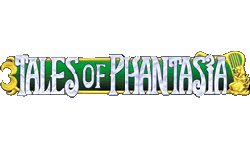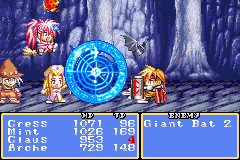|
|

|
PLATFORM
|
GBA
|
BATTLE SYSTEM
|

|
INTERACTION
|

|
ORIGINALITY
|

|
STORY
|

|
MUSIC & SOUND
|

|
VISUALS
|

|
CHALLENGE
|
Moderate
|
COMPLETION TIME
|
20-40 Hours
|
|
OVERALL

|
+ The majority of gameplay elements are rock solid.
- None of them stand out as particularly impressive.
- Weak localization.
|
Click here for scoring definitions
|
|
|
In early 1996, Wolf Team released its last and most famous game: Tales of Phantasia. Although the conflicts that arose during the final stages of the game's development led to the team being split into tri-Ace and Namco Tales Studios, Tales of Phantasia was a big hit and launched a series that is now a dozen games strong in Japan. Unfortunately, the series' publisher Namco Bandai has a spotty history of bringing these titles to North America, and it wasn't until over ten years later that North America finally saw a release on the Game Boy Advance. But ten years is a long time for a video game, and Tales of Phantasia arrived a bit too late to the party.
Tales of Phantasia tells the story of Cress, a beginner swordsman whose village is destroyed while out hunting with his friend Chester. After watching his parents die, Cress sets out on a quest for revenge which soon evolves into a quest to save the world from a diabolical menace named Dhaos. This quest takes him a hundred years into the past, and later fifty years into the future, in order to gather the necessary power to defeat Dhaos once and for all.
Although the story is put together well, the localization is not particularly impressive. Had it been released in the late nineties when the title originally saw its release, it would have been excusable, but by 2006 standards, the game fails to measure up, especially when compared to Tales of Symphonia, which was released two years prior, or Tales of Legendia, which was released a month before Phantasia. The characters still manage to be amusing, and a fair bit of entertainment can still be found throughout the adventure, even if the dialogue is a bit stiff most of the time.
 The new battle sprites are detailed and adorable.
The new battle sprites are detailed and adorable.
|
|
Just as the localization feels dated, the gameplay does as well. Tales of Phantasia features the original form of the Tales series' trademark Linear Motion Battle System (LiMBS). In the late '90's, this was brand new stuff, but today it feels simplistic and a bit sluggish. Players take control of Cress on a 2D battlefield while enemies and allies act based on artificial intelligence in real-time. Cress can move left and right and launch various attacks and skills. The battle can also be paused at any time in order to use items or manually issue commands to allies.
Despite being an action-RPG, the combat is fairly slow paced. Every time Cress finishes up a string of attacks, he runs back to the place he started from automatically unless the player forces him to stop. Many battles, particularly in the early part of the game, involve a lot of hit-and-run tactics, which makes the game feel almost like a turn-based title. As the game progresses and longer combos can be launched, combat gets a lot more frenzied, but even so, players will likely find themselves regularly opening the menu in order to issue manual commands. Luckily, despite the simplicity of the combat, it still manages to be rather fun thanks to a fairly steady difficulty that's rarely too easy or too hard. Even normal encounters can be deadly if not treated with care, particularly towards the end of the game. The only exception to this curve is the very beginning of the game, as the first "boss" requires the player grind up a few early levels in order to survive.
Much of Tales of Phantasia follows a fairly nonlinear structure, and this leads for plenty of opportunity for side quests and exploration. It's very rare for the game to tell the player where to go next, and exploring various dungeons and discovering new areas not only advances the story, but provides access to new spells and summons for the game's magic-wielding characters. It's a double-edged sword, though, as it's easy get stuck without any clue where to go next. It's also possible to trek through a rather long dungeon only to discover that you can't complete it until you visit another place first. This leads to a lot of backtracking that can get a bit irritating, though the small world map and rapid travel speed help ease this a bit. Among these sidequests is one unique to the GBA version of the game, which recruits a new party member, Suzu.
 Ten years after the fact, Tales of Phantasia is finally in English.
Ten years after the fact, Tales of Phantasia is finally in English.
|
|
Players can also engage in the cooking of food, a practice which is delicious in the real world, but provides helpful healing functions in Phantasia. The actual usefulness of the cooking feature of Tales of Phantasia is debatable, since healing items are cheap an abundant, but finding and mastering new recipes is an amusing sub-game nonetheless.
Visually, Tales of Phantasia on the Game Boy Advance is similar to the PlayStation remake of the game that also never saw a western release. The sprites have been redesigned and made more detailed from the SNES version, but the world and dungeon maps remain mostly the same. The battle sprites, in particular, are very detailed and expressive, although the dimensions are extremely warped.
The audio is acceptable, but not particularly impressive. The soundtrack, scored by Motoi Sakuraba, introduces many songs that have become staples for the series, but the majority of the soundtrack is decent, but not terribly impressive. It doesn't help that the style and musical themes introduced here have been rehashed in virtually every game in the series. Tales of Phantasia also features minimal voice acting, and it's really quite terrible. Most of the voices sound completely inappropriate for the characters, but thankfully they're limited almost entirely to battle cries, which make them pretty much irrelevant.
Had it been released in 1996 on the Super Nintendo, Tales of Phantasia would likely have been a smash hit among RPGamers. Unfortunately, it just doesn't have the same impact today as it would have then, and the game itself hasn't held up as well as others from the era. While it's nice to finally experience the game that started the Tales phenomenon, it's merely average when compared to similar, modern titles. Tales fans should not miss out on experiencing the series' roots, but more discriminate gamers can find better experiences elsewhere.
Review Archives
|









